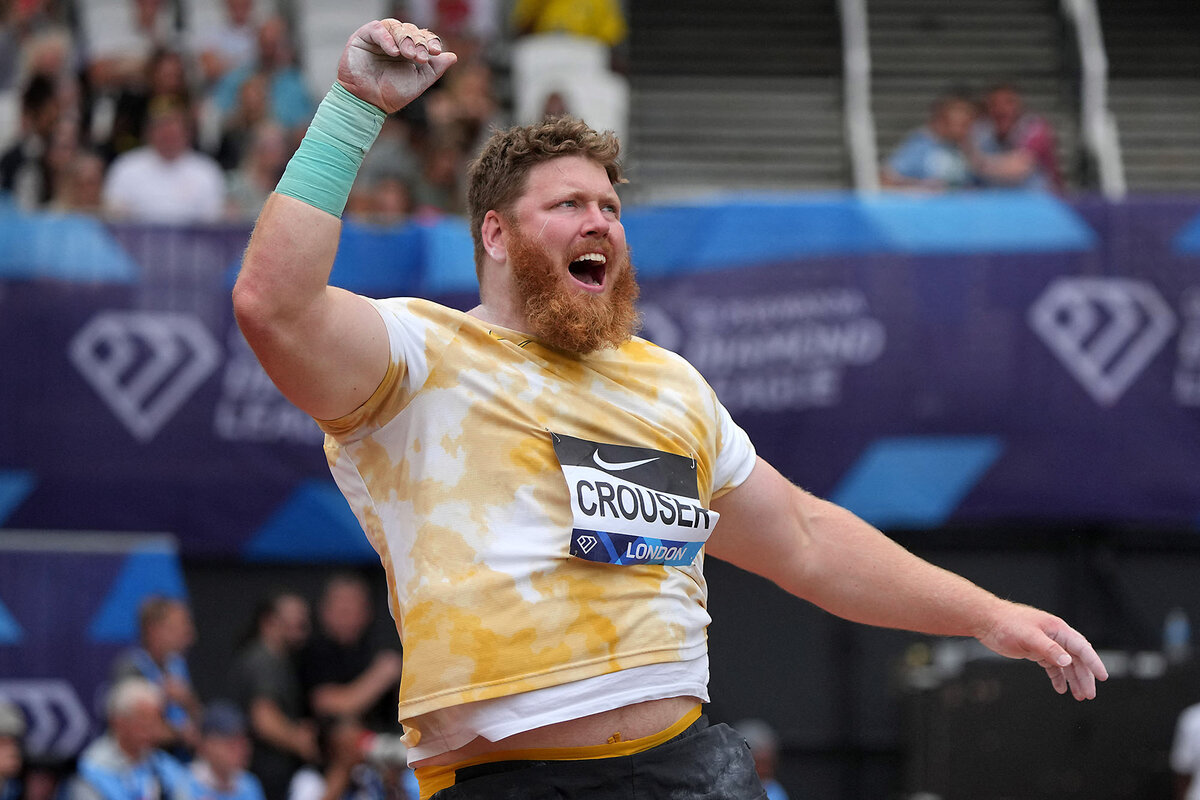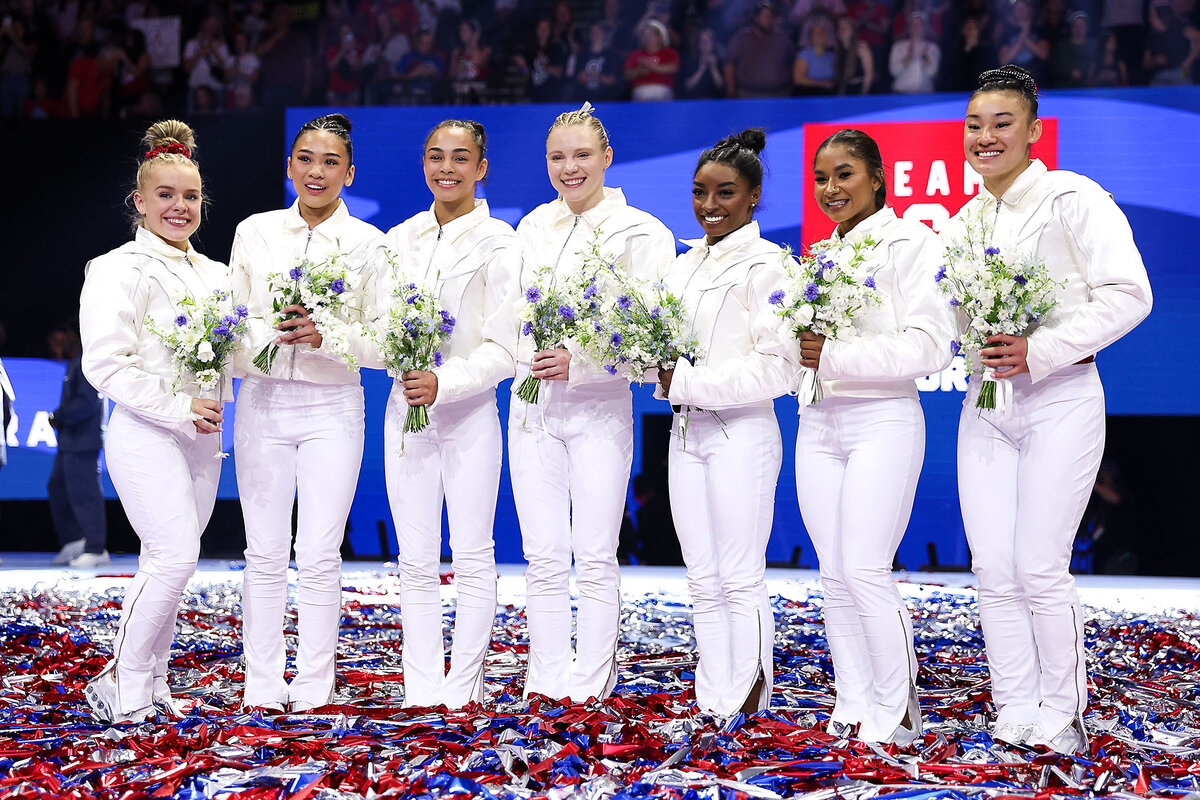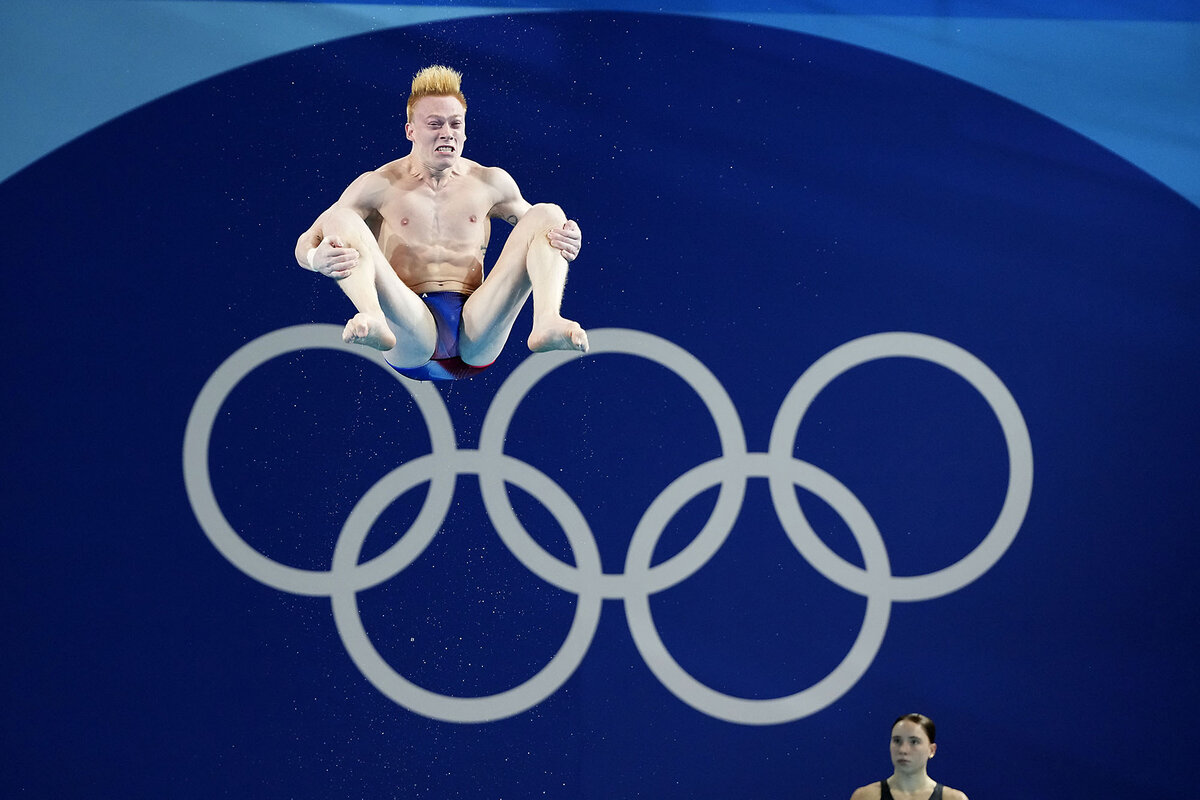We’ll always have Paris. Can the Olympics cheer up a gloomy world?
Loading...
| Paris
Regardless of winners or losers, athletes from around the world uniting for friendly competition is what the world needs, says American shot-putter Ryan Crouser.
“Everyone is there to live that Olympic experience,” said the two-time gold medalist at an event for reporters.
Why We Wrote This
A story focused onPageantry and sport do not guarantee global good feeling. But in tough times in the past, the ideals of the Olympics have helped buoy a weary world. Could it happen again in Paris?
As Mr. Crouser says, the world could use some joy and unity. Wars, attempted assassinations, political unrest, and global inflation after the COVID-19 pandemic have left many feeling like hope is elusive. Certainly, the Olympics have taken place previously during tough times in history, such as the 1930s, amid a global depression and Adolf Hitler’s rise to power. But how much can a two-week sporting event do to offer a jolt of optimism to a world that appears desperately in need of a little good news?
Mr. Crouser cites one of his favorite moments – one he says is less scripted and full of camaraderie.
“What stands out to me always is the closing ceremonies,” Mr. Crouser says. “You go out in whatever order you want with your new friends. And that to me is the summary of the Olympics in a time when we have so many differences.”
Team USA water polo star Maggie Steffens chokes up when she talks about the Summer Olympics. Paris will be her fourth time competing.
“I would say there’s overwhelming pride, whether it’s opening ceremonies or just the opportunity and the gift to wear the red, white, and blue,” says Ms. Steffens, who has won four gold medals since her first Olympics in London in 2012.
In the Olympic Village, where athletes are housed, she has always considered players in different sports from hers as teammates.
Why We Wrote This
A story focused onPageantry and sport do not guarantee global good feeling. But in tough times in the past, the ideals of the Olympics have helped buoy a weary world. Could it happen again in Paris?
“It just elevates you, and I’m really excited for that energy,” Ms. Steffens adds.
The world, like Ms. Steffens, could use a little positive energy. Wars, attempted assassinations, political unrest, and global inflation after the COVID-19 pandemic have left many feeling like hope is elusive. Certainly, the Olympics have taken place previously during tough times in history, such as the 1930s, amid a global depression and Adolf Hitler’s rise to power. But how much can a two-week sporting event do to offer a jolt of optimism to a world that appears desperately in need of a little good news?
Right now, people might indeed need the Olympics and its ideals, says Kristian Ulrichsen, a fellow at Rice University’s Baker Institute for Public Policy.
“I think people definitely need breaks. They need a lift, and sport can provide that,” says Dr. Ulrichsen. “It gives a temporary kind of relief from everyday events, and I think at this moment in time, when there’s so much going on with Ukraine, with Gaza and the election in the U.S. ... It could be the right place at the right time, especially in a place like Paris.”
While so far he would describe the run-up to the opening ceremony as “low-key,” that could change when the boats holding 10,500 athletes sail down the River Seine on Friday.
“Once the Olympics begin, then the excitement builds. Once it starts, often that spirit takes hold, and especially if the country is doing well, that enthusiasm builds. By the time it ends, it becomes much more of a festival or a giant street party,” Dr. Ulrichsen says.
Pageantry and sports do not guarantee global good feeling. The 1972 Olympics in Munich was marred by terrorism, and the 1996 Olympics in Atlanta by a bombing. But even in Atlanta, Dr. Ulrichsen points out, people rallied.
What’s different about Paris?
And among Olympians interviewed, there is a sense that this time will be different. Tokyo, for many of them, came with an asterisk.
American shot-putter Ryan Crouser is a veteran of the Summer Games.
Speaking at an event for reporters in New York this spring, the two-time gold medalist said athletes from different parts of the world uniting for friendly competition is what the world needs, regardless of winners or losers.
“Everyone is there to live that Olympic experience, and I feel like that’s what we missed in Tokyo,” Mr. Crouser added.
At the last Olympics, held in Tokyo in 2021, athletes were forced to wake early to take COVID-19 tests, and compete alone and without their families in attendance. No cheers fueled their efforts. Newspaper headlines spoke of caution because of mask mandates and vaccinations. This time, cheering sections will be noisy with fans eager to scream.
Energy has been growing in France since 150,000 people watched the transfer of the Olympic torch being passed off to French Olympic gold medal swimmer Florent Manaudou in the port of Marseille. This week, athletes from participating countries are arriving. The U.S. women’s gymnastics team, which moved into the Olympic Village on Monday, was all smiles on an apartment balcony, teasing “And a little girl power for your timeline!” on Instagram. Hôtel de Ville (Paris’ city hall), where the marathon will begin, hosted hundreds of partygoers, who danced and sang at a free concert in the courtyard.
One source of optimism for both women athletes and their fans is that the 2024 Summer Games mark a historic moment: The number of men and women competing will be equal for the first time in Olympic history. It’s a huge leap from just over 2% in 1900, the first games that allowed women Olympians.
Chellsie Memmel, a U.S. gymnastics coach and technical lead for the women, says that the defending gold medal team was in high spirits. And for them, getting the full welcome experience from the host country was new and moving, even for gymnasts who competed in Tokyo.
“For them to be able to do that and to do it together, I think they really appreciated it and it was a bit emotional,” said Ms. Memmel, herself a silver medalist, at a Monday press conference in Paris.
Brett McClure, one of the men’s team coaches and high performance director, says he sees excitement in the men, who may have a chance to medal after missing the podium in recent Olympics. “They were absolutely thrilled to get into the village. They couldn’t wait to set up their apartments, and are just having the time of their lives,” says the Athens, Greece, silver medalist.
One of the things that will make Paris more exciting will be the fans, he says. Bercy Arena can hold more than 16,000 people, he adds, which is day and night from Tokyo with its empty stands.
“It’s going to be so amazing,” he says, smiling.
When the people you love best are cheering you on
Many returning athletes spoke about what it will mean to them to be able to compete with their families there. For them, the chance to perform the sport they love in front of the people they love best is a definite source of joy.
“This is my second Olympics, and the first one I didn’t get to bring my family along with me. So just being able to [be with] family and friends and having that experience is going to be really special,” says silver medalist and springboard diver Andrew Capobianco, speaking at the New York press event. This time, instead of just the stress of the trials, he adds, they’ll get to experience the fun.
“I’m so excited for that,” Mr. Capobianco says.
Ms. Steffens, who got married last fall, is also excited for her husband and her family to be with her.
“It’s an opportunity to give gratitude,” she says. “When you’re at the Games, it’s your one moment to perform and play for all of the people who have supported you.”
Now competing in his third straight Games, Mr. Crouser says that there is a stark difference between the feelings of the opening and closing ceremonies. And for him, there is no comparison.
The 6’7” champion says that the opening ceremony is regimented, with competitors appearing with their compatriots under their flag, waving.
“What stands out to me always is the closing ceremonies,” Mr. Crouser says. “You go out in whatever order you want with your new friends. And that to me is the summary of the Olympics in a time when we have so many differences right now.”
Learn more about this year’s competitors: The Olympic spirit: 7 athletes share tales of grit and sacrifice











